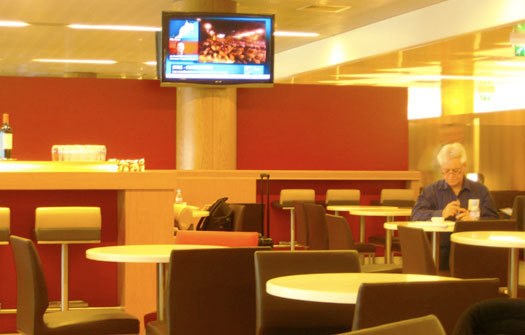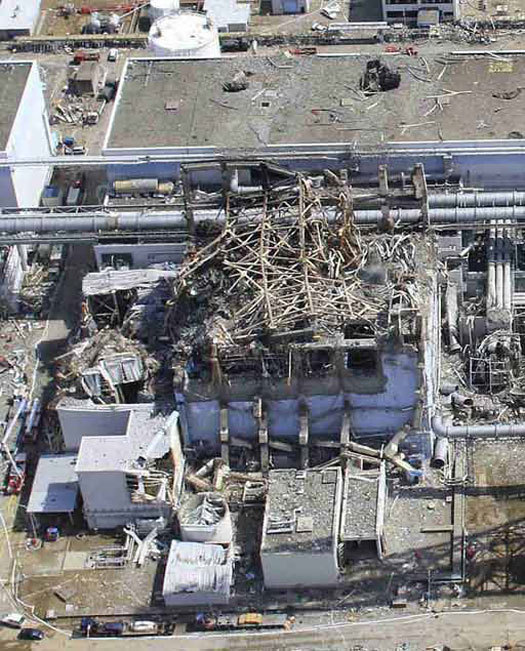The first one (below) was taken in a lounge at a Paris airport. I remember being struck by the intense design effort that had been made to create a controlled and insulated environment. On the tv screen were images of the popular revolt that is unfolding, bloodily, in Yemen. But the sound was off, and the effect was to dampen any awareness we global travelers might have of the outside world — such as those guys fighting for freedom on the Arab street.

The second image that's bugged me is this new shot of Unit 3 at Fukushima.

Now I don't know about you, but I've been under the impression that the situation in Fukushima, although dramatic, is qualitatively less serious than Chernobyl. I've read reports (sometimes whilst sitting in lounges like the one in Paris) that the Japanese plants have a more modern design, and that those long-distance shots of smoke coming from the buildings were “more of a leak than an explosion.”
Then I saw this photograph: Does that look like a “leak” to you? The image appears in Stoneleigh's long report about Fukushima. She is at pains to remind us that “nobody knows, for sure, how bad the impacts of Fukushima will be in the long run” — but then explains that the pool at unit 3 contained almost an entire core of spent fuel — and that fifty metres from Unit 4 is — or was — a larger store of spent fuel with a volume of 3,828 cubic meters (in feet: 290 x 120 x110 deep).
Nobody knows for sure that the fuel has been blown to smithereens and into the air and the sea — but if I look at the photograph I find it hard to believe that the long-term consequences will be benign.
The writer George Monbiot has attacked nuclear energy's opponents for their double standards. “In the normal course of operations, at least six people are killed in Chinese coal mines every day” he argued; “even if you accept the official figure, Chinese coal mining alone kills as many people every week as the worst nuclear power accident in history — the Chernobyl explosion — has done in 25 years.”
This may well be true, but I question whether Monbiot, in his search for a single “standard,” is comparing like with like. Why did he not remind us that one thousand children are killed on the roads every day?
Deaths on the road share a common root cause with power station deaths: our world's growing transport intensity and the energy needed to sustain it. The debate we need to have is not about nuclear versus coal versus solar as energy sources; it's about the energy and resource intensity of the economy as a whole.
Design that protects us from this uncomfortable issue — design that smooths our way through life as that lounge smoothed my passage in Paris — does us a disservice in the long run.

Comments [7]
05.03.11
02:28
05.03.11
02:32
Cam, roads, gas stations, wiper blades, driving license holders, overpasses...everything detail of the infrastructures that enable cars to keep moving is energy-dependent. Which source of energy is used to keep one element or another of the system going is a secondary detail.
05.03.11
05:03
This fact, combined with their greater than average mass and precious & heavy metal consumption in connection with their batteries, will increase the gross BTU requirements per mile, a gap that for the foreseeable future will be filled largely with coal.
And neither of these vehicles will do anything to reduce the carnage on our highways, over 40,000 people killed each year in the United States alone, nearly 300% more than are murdered by guns, and hundreds of thousands are injured in life-debilitating ways.
This should be a public health issue, one that in a single year, if properly accounted, would dwarf the deaths attributable to coal mines and nuclear power plants combined - but it isn't.
Life is precious if its in an airplane, train or ship, but apparently disposable once someone gets behind (or in front of) the wheel; I don't know how the regulators, automotive designers & traffic engineers sleep at night.
05.03.11
11:00
05.05.11
05:47
05.05.11
08:04
Georgy, Monbiot is a smart guy - it's just that he can't envisage any situation in which we would voluntarily give up our modern energy-dependent comforts. Therefore, since we'll use the energy anyway [he reasons] better get the energy from a source [nuclear] that does less harm than other sources. The fallacy behind his thinking - and a lively debate - can be explored here: http://bit.ly/kbdChp
Eric, We are sooo bad at thinking [and counting] long-term. I saw a heart-breaking photo of a little girl being scanned by a geiger counter at Fukushima. Fifty years ago, those nuclear plants were sold to Japan's citizens "in the interests of our children and grandchildren". Well, she was one of those grandchildren. John Michael Greer puts it [in the thread I recommend to Georgy above] so well: "The whole point of environmentalism is giving up the habit of stealing from the future -- grabbing at benefits now and pushing the costs off onto our descendants".
05.07.11
02:51